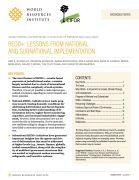Mengakhiri Deforestasi Hutan Tropis: REDD +: Pelajaran dari Implementasi Nasional dan Subnasional

Ringkasan
REDD+ - yang merupakan singkatan dari Reducing Emissions from Deforestation, and Forest Degradation, and the Role of Conservation, Sustainable Management of Forests, and Enhancement of Forest Carbon Stocks in Developing Countries - diluncurkan lebih dari satu dekade yang lalu. REDD+ memberikan harapan bahwa sebuah pendekatan insentif berbasis hasil dalam mengurangi deforestasi dan degradasi hutan tropis bisa berhasil saat pendekatan lain telah gagal. Sejak saat itu, lebih dari 50 negara telah menginisiasi strategi REDD+, pemerintah subnasional telah menguji coba program REDD+, dan lebih dari 350 proyek REDD+ telah diimplementasikan secara global. Apa saja pelajaran yang bisa diambil dari inisiatif REDD+ sejah ini? Bagaimana pelajaran tersebut bisa mendukung upaya mitigasi perubahan iklim berbasis hutan?
Ringkasan Utama
Publikasi ini untuk sementara hanya tersedia dalam Bahasa Inggris.
- The novel feature of REDD+—results-based payments at jurisdictional scales—remains largely untested due to a lack of international finance and the complexity of such systems. Therefore, it is not yet possible to make rigorous generalized conclusions regarding its current impacts and future potential.
- National REDD+ initiatives have made progress toward creating domestic conditions for addressing deforestation and forest degradation, including better understanding of deforestation drivers, higher forest-monitoring capacities, and increased stakeholder engagement. However, these advancements have not yet turned the tide on deforestation. For the most part, new coalitions calling for change in forest governance have failed to overcome business-as-usual deforestation.
- Subnational REDD+ initiatives have generated important insights into the agents and drivers of deforestation that must be addressed at higher levels (e.g., tenure, finance, globally traded commodities), along with the complexity of multilevel governance structures that are needed to implement carbon accounting, safeguards, and incentive systems.
